
views
- Feed your cat bland food (like boiled skinless chicken breast) in small portions once every 2-3 hours.
- Make sure that your cat is drinking plenty of water, as passing diarrhea dehydrates them.
- Contact your vet if you notice bloody diarrhea or if your cat doesn’t act like their normal self.
Home Remedies
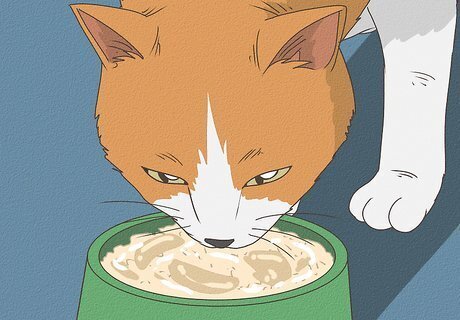
Switch your cat to a bland diet. Take your cat off their usual cat food and feed them small portions of bland, unseasoned food throughout the day, like boiled skinless chicken breast and white rice (flavored with chicken broth, if you’d like). Stick with 1-2 tbsp (9-18 g) of food once every 2-3 hours; if your cat responds well to the diet, give them ¼ to ½ cup (35-70 g) of food once every 4 hours. Pan-fried turkey or extra-lean ground beef are possible options for this diet. You can also switch out the rice with sweet potatoes, cooked pasta, or cooked oatmeal. It’s not a great idea to feed your cat large portions of food while their GI system isn’t at 100%. Once their poop starts to look solid again, transition your cat back to their usual diet. Over a period of 2 weeks, add a little bit more of their original food to their meals. Once your cat is comfortable with the mixture of old and new food for 7 days straight, switch them back to their original food.
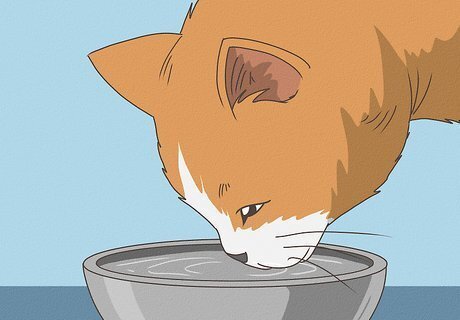
Keep your cat hydrated as they recover. Check your cat’s water bowl often and make sure that it’s topped off with plenty of fresh, clean water. Diarrhea makes your cat lose a lot of fluids, so it’s important to keep them hydrated as they get better. Pour a little bit of low-sodium chicken broth and water into your cat’s food to help boost their hydration. Feel free to offer rice water, too—this is the leftover water after you've cooked rice on the stovetop. Simply combine water and rice at a 3:1 ratio on the stovetop to get the liquid you're looking for.
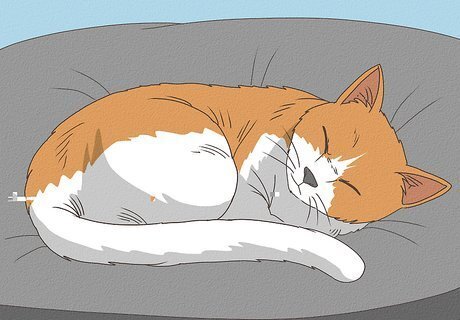
Let your cat get plenty of rest. Just like humans, cats may require some extra time to rest and recuperate as they work through a bout of diarrhea. Make sure that your cat has comfortable places where they can rest and unwind without being disturbed, so they can continue to heal.
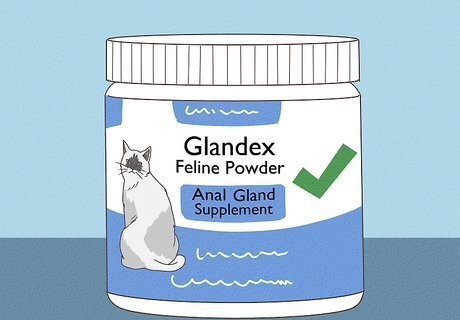
Give your cat fiber supplements to help their stool pass more easily. Shop around for fiber supplements designed specifically for cats, checking the nutritional info before you make any purchases. As a general rule of thumb, cats don’t need a lot of fiber in their diets—in fact, healthy and older cats only need 1.4-3.5% of their daily calories to be fiber. Good fiber supplements: VETNIQUE LABS Glandex Feline Anal Gland Fiber Supplement Powder, kin+kind Pumpkin Boost Organic Fiber for Cats, FiberVet Fiber Supplement for Dogs and Cats Let’s say that your cat eats around 200 calories each day—that means they only need 2.8 to 7 calories worth of fiber each day. Since there are 4 calories in 1 gram of fiber, your cat would only need 0.7 to 1.75 grams of fiber each day.

Feed your cat 1 US tbsp (15 mL) of pumpkin twice each day. Before giving your kitty their breakfast and dinner, add a spoonful of unsweetened pumpkin to their food. Pumpkin is rich in fiber and may help bulk up your cat's stool a bit more. Good pumpkin products: Weruva Pumpkin Patch Up!, Nutri-Vet Digestive Supplement, Raw Paws Organic Pumpkin Powder, Fruitables Pumpkin Digestive Supplement
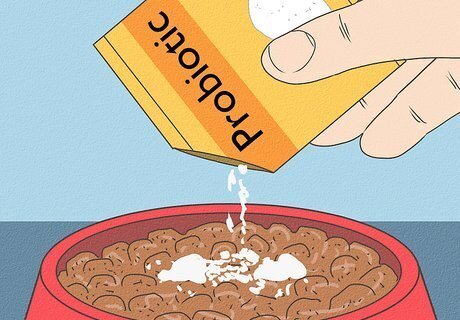
Offer your cat probiotic supplements once per day. Pick up some probiotics that contain lots of live bacteria—this will be measured in Colony Forming Units (CFUs) on the package. Ideally, look for products that list the specific strains of probiotics that are in the supplement, so you know exactly what your cat is consuming. Add the probiotic to your cat’s meal once a day and see if it helps their symptoms improve. Good probiotic supplements: Purina Fortiflora Cat Probiotic Powder Supplement, PetUltimates Probiotics for Cats, Tummy Works Probiotic Powder for Dogs & Cats
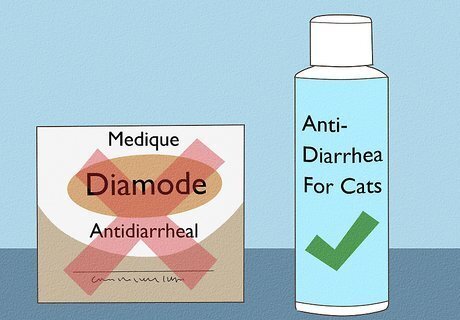
Steer clear of OTC medications meant for humans. Human anti-diarrheal medications (like Diamode) can create health issues for your cat, so make sure you don’t feed them to your cat. Instead, consult with your vet and see which anti-diarrheal medications are safe options for your pet.
When to See a Vet
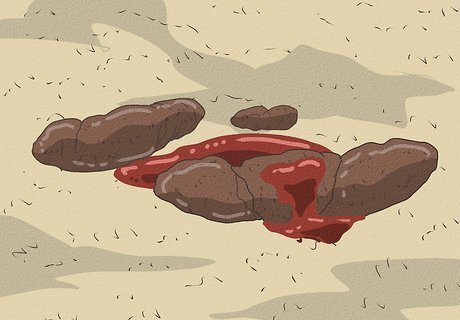
You notice bloody diarrhea. Blood in a cat’s bowel movements isn’t necessarily a cause for panic, but it definitely shouldn’t be taken lightly, either. If you notice bloody diarrhea, call up your vet as soon as possible. Bloody stool can signify a variety of issues, from parasites and food intolerances to infections and polyps. In any case, it’s always best to get a second opinion from your vet. Call your vet if your cat’s poop looks black and tar-like, too. This is a sign that your cat has digested blood.
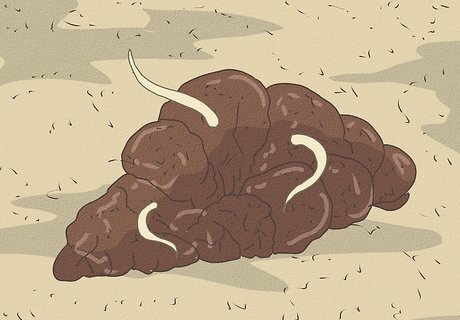
You notice worms in your pet’s stool. Diarrhea is a common symptom of several different parasitic infections, like roundworm, hookworm, and whipworm. If you notice any evidence of worms in your cat’s waste, call your vet right away so your kitty can receive proper treatment.
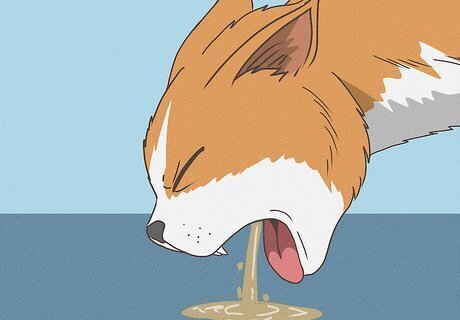
Your cat vomits, acts tired, and isn’t their normal self. Pay attention to how your cat’s behaving. Are they energetic and behaving like they normally do, or are they displaying other symptoms, like fatigue and vomiting? If your cat seems like they’re seriously under the weather, get in touch with your vet ASAP. Pay attention to your cat’s appetite, too; if they don’t seem to be as hungry as they usually are, call up your vet. Contact your vet if your cat’s gums look pale. When combined with symptoms like diarrhea, this can be a sign of a more serious illness.
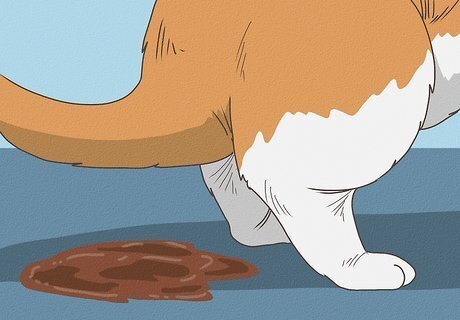
Your cat’s symptoms don’t improve after a day. For some cases of diarrhea, at-home treatment (like probiotics and a bland food diet) are enough to help your cat start feeling better. If your cat’s diarrhea doesn’t seem to improve (or gets worse), though, schedule an appointment with your vet right away.
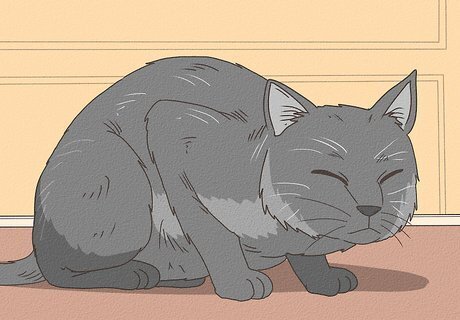
Your cat is elderly, very young, or dealing with existing medical issues. Diarrhea can be a more serious issue for cats that can’t deal with illnesses well, like kittens, senior cats, or sick cats. If your cat falls into one of these categories, take them to the vet instead of sticking with at-home treatment.
Medical Treatments
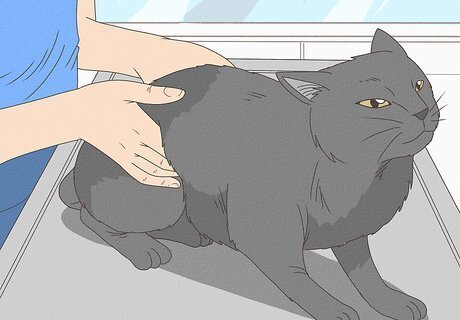
Take your cat to the vet for an official diagnosis. Your vet can take a closer look at your cat’s medical history and give them a physical check-up to see what’s wrong. Follow your vet’s instructions before the appointment—chances are, they’ll ask you to collect a stool sample for testing. Your vet might also get other tests to help with their diagnosis (like blood work, rectal swabs, DNA testing, etc.). Give your vet as much information as possible about your cat’s symptoms, like when you first noticed the diarrhea, how often they pass a bowel movement, how the diarrhea looks, and so on. Diarrhea can be caused by a lot of different factors, from diet changes and allergies to infections and polyps. Your vet can help narrow down the cause, so you can treat your cat’s diarrhea at the source.
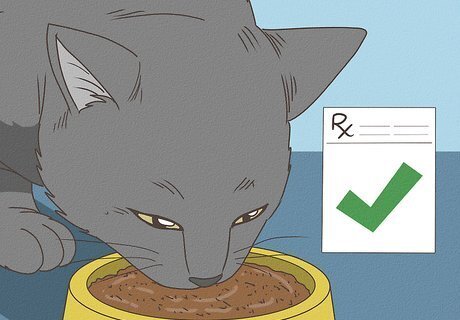
Follow your vet’s dietary recommendations. In some cases, your vet might advise limiting your cat’s food for up to a day, or giving them small portions of a specialty GI-targeted diet. Try to follow your vet’s instructions as closely as you can to help your cat recover.
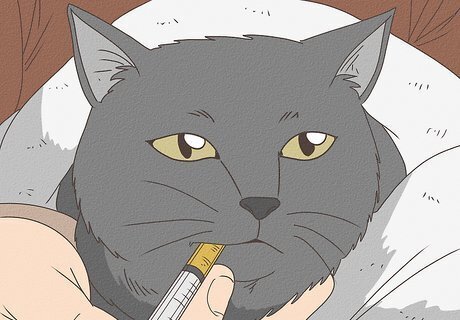
Give your cat a prescription medication per your vet’s instructions. Diarrhea can be caused by a lot of different factors, so your vet could prescribe steroids, antibiotics, or an entirely different medication. Follow your vet’s dosage instructions with whichever medicine you receive, so your can start feeling better ASAP. Ask your vet about scheduling a follow-up appointment as well—that way, they can see how your cat is improving.




















Comments
0 comment